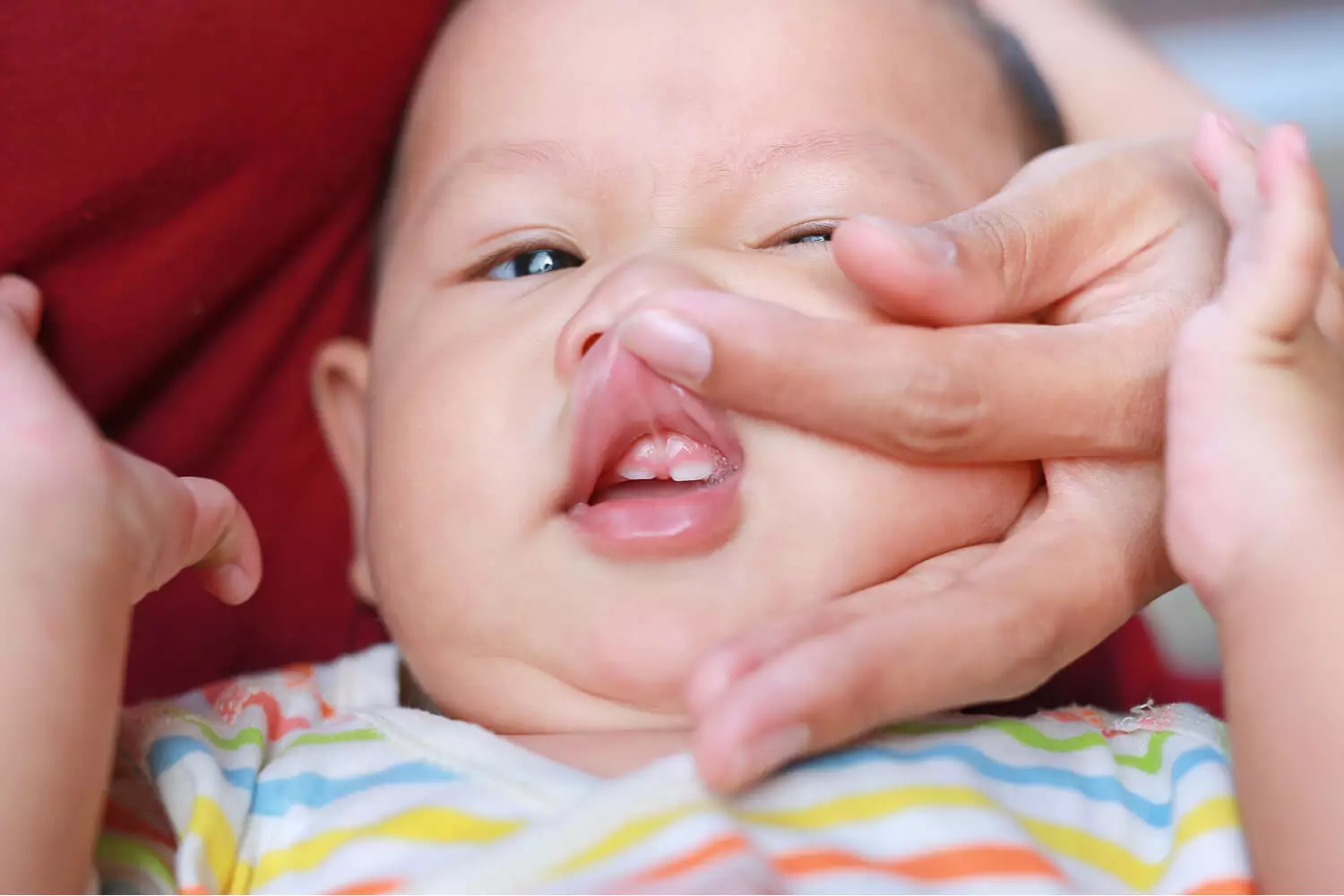When the labial frenulum (the band of tissue that connects the top lip to the gums) is abnormally thick, tight, or short, it causes a condition known as “lip tie.” Problems with nursing, articulation, lip tie, and oral health can result from this. This article will go through the signs and symptoms of liptie as well as its causes, treatments, and ways to prevent it.
Symptoms
- Depending on how severe the disease is, lip tie can manifest in a variety of ways. Symptoms that are fairly prevalent include:
- Problems latching on to the breast, leading to inadequate nutrition and weight gain in infants with liptie.
- In older children, liptie can lead to articulation issues such trouble pronouncing particular words or sounds.
- Cavities, gum disease, and a noticeable space between the front teeth are just some of the dental problems that may result from a liptie.
- Lip tie can cause pain and discomfort in the top lip and gums for some persons.
Causes
Lip tie is likely caused by genetics, although no one knows for sure. Possible causes include birth trauma or prenatal abnormalities.
Treatment
The severity of liptie and the associated symptoms will determine the course of treatment. liptie, Among the various possible treatments are:
Frenotomy is a treatment in which the tissue that connects the top lip to the gums is surgically severed, typically using a laser but sometimes with scissors. This can be done in the comfort of your doctor’s office, and it won’t take long at all. When a baby is having trouble breastfeeding, a frenectomy may be performed.
In extreme cases of liptie, a surgical treatment called frenuloplasty may be necessary. The frenulum is divided and repositioned so that the top lip can move more freely.
Speech therapy is a form of therapy used to help people of all ages who are having trouble communicating do so.
Prevention
- Although there is no foolproof method of preventing liptie, the following can help lessen the likelihood that your child will have the condition:
- Having access to high-quality prenatal care is essential for ensuring a healthy pregnancy and delivery.
- It is possible to lessen the likelihood that a liptie will interfere with breastfeeding if you take steps to ensure a good latch during nursing.
- Treatment of lip ties as soon as possible can reduce the risk of complications and enhance long-term outcomes.
- Lip tie is surprisingly common, however it is frequently misidentified or mistreated. Not all doctors will identify the signs or know what treatments are available. Finding a doctor familiar with liptie and its treatment options is essential.
- Some home remedies for liptie may also be helpful in addition to the medical treatments already discussed. For example:
- Massaging the frenulum helps loosen the tissue, liptie which in turn increases upper lip mobility.
- Flexibility in the upper lip can be increased and pain alleviated with regular stretching.
- Breastfeeding success rates are higher when babies with liptie use nipple shields.
Please note that none of these cures are meant to replace professional medical care. When in doubt, consult your doctor before attempting anything new.
It’s possible that lip tie won’t be recognized or diagnosed until much later in life. This may cause long-term issues with communication, oral health, and confidence. Talk to your doctor or dentist right away if you think you or your kid may have liptie so that you may get an accurate diagnosis and start treatment.
In addition, tongue tie, in which the tissue attaching the tongue to the floor of the mouth is overly tight or short, can sometimes occur in tandem with lip tie. Problems with breastfeeding, communication, and oral hygiene are all possible outcomes. Talk to your doctor or dentist about treatment options if you or your kid exhibit symptoms of both lip tie and tongue tie.
Consequences of Ignoring Lip Tie
- Lip tie has many potential side effects if it is not treated.
- Poor dental hygiene: Lip tie can make it harder to properly brush and floss, increasing the likelihood of tooth decay and gum disease.
- Lip ties restrict the range of motion of the upper lip, making it difficult to articulate certain sounds and words.
- Problems with eating: If you have a liptie, you may have trouble eating foods that call for a flexible upper lip.
- Liptie can have a negative impact on a person’s sense of self-worth and confidence if it impacts their appearance or makes it difficult for them to interact with others socially.
Stopping Lip Ties
While it is true that lip tie prevention is not always possible, there are measures that can be taken to lessen the likelihood of developing the condition. For example:
- Breastfeeding can aid in the development of a healthy upper lip and may reduce the likelihood of liptie occurring.
- Receiving good prenatal care, such as regular checkups and a healthy diet, may lessen the likelihood of liptie developing in a newborn.
- Lip tie can be prevented by avoiding risk factors, such as maternal smoking during pregnancy.
- Lip tie can be treated and the risk of complications reduced if it is discovered and treated quickly.
Infant lip tie
Since lip tie can prevent an infant from successfully breastfeeding, it is most commonly observed in newborns. Possible infant liptie symptoms include.
- Trouble latching on to mom or dad’s breast or bottle liptie
- Having trouble opening one’s mouth completely
- Refusal to eat or extreme fussiness while eating
- Failure to Gain Weight
- Feeding time is accompanied by clicks
- Lip ties in infants can be treated with a frenectomy, a surgical procedure, or with breastfeeding aids like nipple shields or specialized breastfeeding techniques.
Adult Lip Ties
- Most often seen in infants, liptie can also affect adults. In adults, liptie can cause a variety of symptoms.
- Problems maintaining good oral hygiene
- Loss of gum tissue or decayed teeth
- Trouble Expressing Oneself
- Problems digesting specific foods
- Dissatisfaction with one’s physical appearance
- Lip ties in adults can be treated with a frenectomy or another procedure, depending on the severity of the condition and the symptoms being experienced.
Conclusion
In conclusion, lip tie is a medical disease brought on by an overly restricted frenulum (the tissue that joins the top lip to the gums). Physical and mental issues can arise from a lip tie, such as trouble nursing, dental issues, speech challenges, and self-consciousness. Receiving appropriate prenatal care and avoiding certain practices can minimize the incidence of liptie, but they won’t eliminate it entirely.
Depending on the severity of the condition and the symptoms being experienced, treatment for liptie may require a combination of medical intervention, home cures, and surgical methods. Individuals affected by lip tie can learn to live with their condition and achieve their full potential with the help of professionals trained in diagnosis, liptie,treatment, and support.
Seeking medical assistance and learning about possible treatments is essential if you or your kid are suffering liptie symptoms. Improving health and wellbeing and avoiding issues related to lip tie can be achieved by proactive management of the condition.











